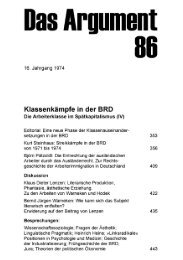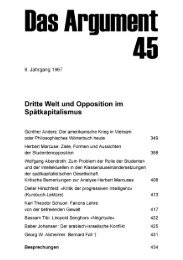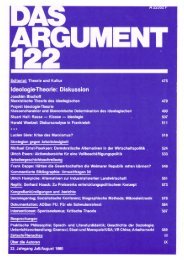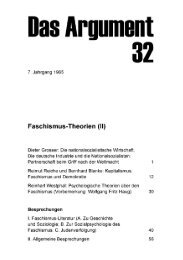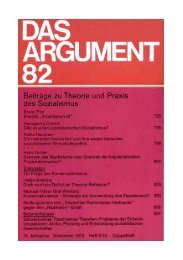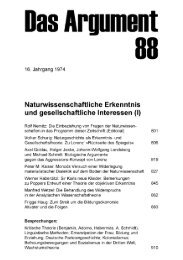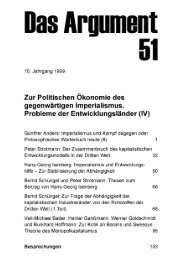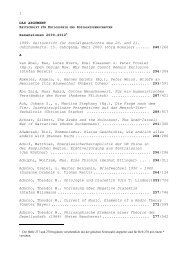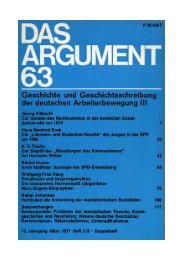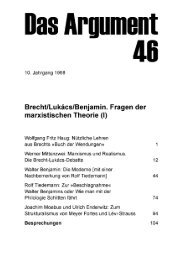HKWM and MEGA complement each other 1
HKWM and MEGA complement each other 1
HKWM and MEGA complement each other 1
Create successful ePaper yourself
Turn your PDF publications into a flip-book with our unique Google optimized e-Paper software.
MONTY JOHNSTONE * <strong>HKWM</strong> AND <strong>MEGA</strong> COMPLEMENT EACH OTHER (1995) 1<br />
Monty Johnstone<br />
<strong>HKWM</strong> <strong>and</strong> <strong>MEGA</strong> <strong>complement</strong> <strong>each</strong> <strong>other</strong> 1<br />
»Habent et sua fata libelli« (books also have their destinies); Marx used to say.<br />
The present volume is a case in point. Conceived by its editor, Wolfgang Fritz<br />
Haug, in 1983 as a supplement to the German translation of Georges Labica's<br />
Dictionnaire critique du marxisme, by 1986 this had been superseded by a project<br />
for a comprehensive Euro-Marxist, <strong>and</strong> later more widely international,<br />
conceptual dictionary st<strong>and</strong>ing in its own right. As the work was underway on<br />
this, the collapse of »Marxist« regimes in the Soviet Union <strong>and</strong> Eastern<br />
Europe prompted a critical re-examination by Marxists east <strong>and</strong> west of many<br />
of their previous ideas. This slowed down progress towards publication but<br />
provided the basis for drawing in a wider range of contributors of different<br />
nationalities <strong>and</strong> varying trends. This was very much in keeping with the<br />
conception of Plural Marxism, which Haug had developed from 1985 in 2<br />
volumes under that title in opposition to the dogmatic official »Marxism-<br />
Leninism« serving as a state ideology then holding sway in the countries of<br />
»real existing socialism«. If in his foreword to the first volume of this Historical<br />
Critical Dictionary of Marxism (<strong>HKWM</strong>) Haug may be going a bit far in using<br />
Althusser's phrase »epistemological break« in relation to the present project, it<br />
is certainly clear that it is characterised by a greater diversity <strong>and</strong> a more critical<br />
attitude to many traditional Marxist propositions than would have been the<br />
case earlier. Indeed Haug now speaks of »relentless criticism« also in relation to<br />
its own past as a condition for the survival of Marxist thought.<br />
1<br />
<strong>MEGA</strong>-Studien (Amsterdam), 1995/2.<br />
1
MONTY JOHNSTONE * <strong>HKWM</strong> AND <strong>MEGA</strong> COMPLEMENT EACH OTHER (1995) 2<br />
The <strong>HKWM</strong> is to encompass 12 volumes <strong>and</strong> will not be completed before the<br />
year 2000. Over 500 specialists from a wide range of countries, east <strong>and</strong> west,<br />
north <strong>and</strong> south, have been enlisted. In this first volume 68 of them contribute<br />
99 entries, 4 of which <strong>each</strong> comprise 2 articles. Fundamental Marxian concepts<br />
like Akkumulation (accumulation), Anarchie der Produktion (anarchy of<br />
production - under capitalism) <strong>and</strong> Ausbeutung (exploitation) are treated along<br />
with present-day themes unknown to Marx. Haug himself writes 12 of the<br />
entries, mostly of substantial length <strong>and</strong> notable erudition. They range from the<br />
much debated dialectical concept of Aufhebung (sublation, transcendence or<br />
supersession), which Marx took from Hegel <strong>and</strong> modified, to an empirically<br />
based entry entitled Apathie im befehlsadministrativen Sozialismus (apathy under<br />
authoritarian-administrative socialism).<br />
The influence on contemporary Marxist thought of new social movements<br />
concerned with ecological, feminist <strong>and</strong> third world questions is reflected in a<br />
number of contributions. Among the latter we find entries on Antikolonialismus<br />
(anti-colonialism) by Samir Amin, on Afrikanische Produktionsweise (African<br />
mode of production) by Catherine Coquery-Vidrovitch, <strong>and</strong> on Arabischer<br />
Sozialismus (Arab socialism) by Wolfgang Schwanitz. Psychological<br />
questions are discussed in entries on Angst (anxiety/fear) <strong>and</strong> on Antipsychiatrie<br />
(anti-psychiatry). There are three entries on different aspects of aesthetics<br />
along with one on Architektur (architecture) <strong>and</strong> one on Autonomie der Kunst<br />
(autonomy of art).<br />
Two contributions are on working class culture. Reflecting the crucial<br />
position of labour (Arbeit) in Marxist thought, a quarter of the entries in this<br />
volume, devoted as it is to concepts beginning with the letter A, are on this<br />
<strong>and</strong> related themes. Frigga Haug leads in with a wide-ranging 11-column<br />
contribution tracing the concept of labour from Aristotle's influence on<br />
2
MONTY JOHNSTONE * <strong>HKWM</strong> AND <strong>MEGA</strong> COMPLEMENT EACH OTHER (1995) 3<br />
Marx up to the housework debate in the women's movement. The entries<br />
that follow include a critical consideration of such important themes of<br />
Marxist debate as the labour aristocracy, the working class <strong>and</strong> its structure<br />
<strong>and</strong> revolutionary potential, <strong>and</strong> the labour process. Arbeitszeitverkürzung<br />
(reduction of working time) is discussed in two contributions, one<br />
dealing with the relevant background in Marx's writings, particularly the<br />
Grundrisse <strong>and</strong> Theories of Surplus Value, <strong>and</strong> the <strong>other</strong> with recent<br />
literature on this topical question.<br />
The <strong>HKWM</strong> does not include entries on places, organisations or<br />
individuals. However the latter appear under entries for movements, trends<br />
or schools identified with them. Thus in the present volume we find the<br />
Abendroth School with its founder's biography <strong>and</strong> ideas sympathetically<br />
treated by Heinz Jung, <strong>and</strong> the Althusser School, of which Frieder Otto<br />
Wolf gives a useful account of the most important concepts, literature <strong>and</strong><br />
controversies.<br />
Judging by the cross-references appreciable overlap can be expected in the<br />
treatment of themes in the 12 volumes. This is already apparent to a degree<br />
in this one volume. However it may be a necessary price to pay if different<br />
approaches to controversial questions are to be adequately set out <strong>and</strong> the<br />
pluralist objectives of the enterprise attained. We find for instance under<br />
Arbeiterkontrolle (workers' control) that Theodor Bergmann sees for Lenin<br />
»democracy in the workplace as an integral part of democracy in society as<br />
a whole« (col. 466), whereas under Arbeiterstaat (workers' state) Werner<br />
Mackenbach insists on »the depriving of the factory committees of their<br />
power« as among the first measures of Lenin's Soviet state (col. 491).<br />
Acquaintance at first h<strong>and</strong> with such differing views can only be beneficial<br />
in stimulating the reader to probe the question further. The often quite<br />
3
MONTY JOHNSTONE * <strong>HKWM</strong> AND <strong>MEGA</strong> COMPLEMENT EACH OTHER (1995) 4<br />
extensive bibliography provided at the end of <strong>each</strong> entry will undoubtedly<br />
prove very useful in this respect. Although all the entries are written in<br />
German, the bibliography includes works in English <strong>and</strong> French. A<br />
translation into Arabic, English, French, Russian, Spanish <strong>and</strong> Chinese of<br />
the title of every entry is provided.<br />
The contributions in this volume are not all of equal quality, but in<br />
general the level of scholarship is high <strong>and</strong> often impressive. Obvious care<br />
has been taken by the strong editorial team to avoid factual errors, though a<br />
few have slipped through. Thus the entry on Arbeiterbewegung (labour<br />
movement) presents democratic centralism as the organisational principle<br />
adopted in Russia in 1903 by the Bolsheviks as against that of the<br />
Mensheviks (in fact the principle was proclaimed for the first time by<br />
both Mensheviks <strong>and</strong> Bolsheviks in 1905), <strong>and</strong> the date of Stalin's<br />
enunciation of the possibility of socialism in one country is given as 1923<br />
instead of 1924 (col. 436). In the bibliography to Aktionseinheit (unity of<br />
action) the date of the Fourth Congress of the Communist International is<br />
given as 1931 instead of 1922 (col. 126).<br />
Unfortunately this volume does not contain an index, but I underst<strong>and</strong> that<br />
Volume 2 will carry a consolidated name index for the first two <strong>HKWM</strong><br />
volumes. Subsequent volumes, unlike the present one, will also list the countries<br />
<strong>and</strong> institutions of the contributors including specifying the west or east<br />
backgrounds of those from Germany.<br />
At a time when one so often hears a wholesale dismissal of Marxist ideas, the<br />
launching of this ambitious enterprise represents a bold challenge. Like the<br />
decision to continue with the publication of the <strong>MEGA</strong>, it is founded on a<br />
recognition that the ideas of Marx <strong>and</strong> Engels – »warts <strong>and</strong> all«, if you will –<br />
represent a precious part of our intellectual heritage. The two projects<br />
4
MONTY JOHNSTONE * <strong>HKWM</strong> AND <strong>MEGA</strong> COMPLEMENT EACH OTHER (1995) 5<br />
<strong>complement</strong> <strong>each</strong> <strong>other</strong>. The material appearing in the <strong>MEGA</strong> volumes is an<br />
important source drawn <strong>and</strong> referred to in the <strong>HKWM</strong>. The latter, with its<br />
strong conceptual, historical <strong>and</strong> philological characteristics, offers a quarry of<br />
knowledge <strong>and</strong> references of unique value to all making use of the <strong>MEGA</strong> for<br />
their researches. The birth of this first <strong>HKWM</strong> volume after a gestation<br />
period of ten years is warmly to be welcomed <strong>and</strong> the speediest practicable<br />
appearance of its 11 companion volumes is much to be hoped for.<br />
5



